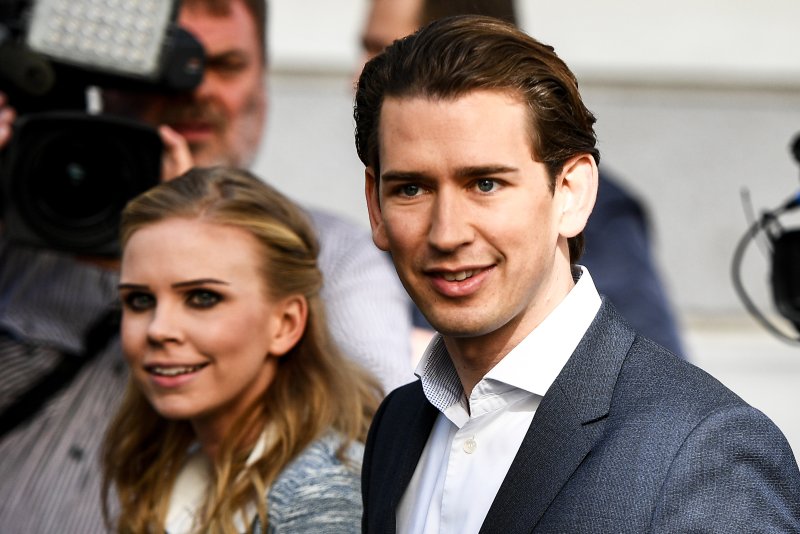Austrian Foreign Minister Sebastian Kurz and his girlfriend Susanne Thier arrive at a polling station in Vienna on Sunday to cast their votes in the Austrian federal elections. Kurz, 31, will become the nation's next chancellor, according to final provisional results. Photo by Christian Bruna/EPA
Oct. 15 (UPI) -- Sebastian Kurz will become Austria's next chancellor and Europe's youngest leader at 31, according to provision final results Sunday.
Kurz's People's Party captured 31.4 percent but because it's not a majority the party will need to form a parliament coalition, likely with the Freedom Party with 27.4 percent, according to the poll results. The 800,000 absentee ballots and ones by voters outside of their home districts need to be counted Thursday.
About 79.3 percent of the 6.4 million voters turned out for the election, up from the 74.9 percent four years ago.
In May, Kurz pulled his party out of the ruling coalition with the Social Democratic Party, which was second in voting Sunday with 26.8 percent. The current chancellor, Christian Kern, was elected 18 months ago as leader of the Social Democratic Party.
"This is a clear mandate for change," Kurz told cheering supporters in Vienna. "We've got a lot of work to do. We need to create a new political style and a new political culture."
The Freedom Party was part of a coalition between 2003 and 2005, the last time a far-right party helped run the government.
The Green Party had only 3.3 percent, which was below the 4 percent cutoff to win a seat in The 183-member National Council, which is determined proportionally based on the votes. The Pilz party, which was started by former Green politician Peter Pilz, and the Neos, a liberal party, surpassed the threshold.
"The result is a catastrophe. It is a defeat for the real questions of the future, the existential questions," Helga Krismer, spokeswoman for the Green Party in Lower Austria, said to The Local in Austria.
The People's Party and the Freedom Party, which is led by Heinz Christian-Strache, have a hard stance on refugees and immigration.
Kurz, Austria's foreign minister, in 2015 opposed opening European Union borders to 1 million mostly Muslim asylum seekers and migrants. That year, Austria took in around 90,000 asylum seekers, mainly Syrian Muslims.
The Freedom Party was originally founded by a former Nazi, Anton Reinthaller, in 1956.
Gernot Bluemel, who is a friend of Kurz and a party official in Vienna, said their party will keep any coalition partner in check.
"The crucial point is we are pro-European," Bluemel said to NPR. "So, we would never accept an anti-European course in the government coalition. We would never accept an anti-Semitic course in government. Never, ever, ever."
Kurz grew up and still lives in the working-class Vienna neighborhood of Meidling. His mother was a teacher and his father was a manager.
"He was raised with the idea that if you work hard, if you play by the rules, then you can achieve your goals. You can realize your dream," Bluemel said. "In a country where the level of taxes is being raised higher and higher, this dream is becoming more and more unrealistic."
Austria is scheduled to take over the European Union presidency next year.
In May, Emmanuel Macron, at 39, was elected the youngest president in France.















